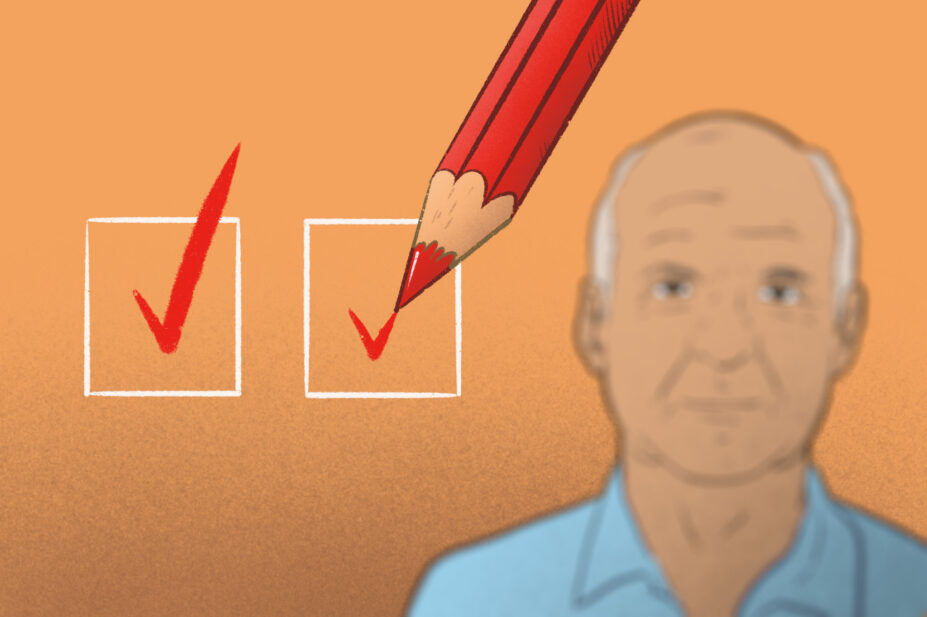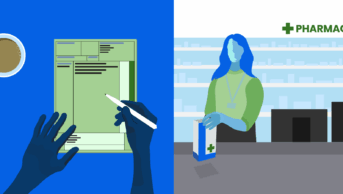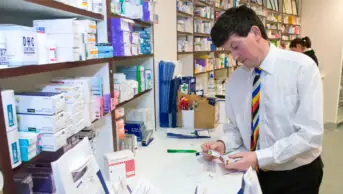
Wes Mountain/The Pharmaceutical Journal
The Royal Pharmaceutical Society’s (RPS’s) credentialing curricula provide a mechanism for defining and assuring post-registration standards of patient-focused pharmacy practice. The curricula span the career continuum, with three assessment points at post-registration foundation, core advanced and consultant-level practice. The curriculum at each level covers five broad domains, aligned closely to the four pillars of advanced practice: person-centred care and collaboration; professional practice; leadership and management; education; and research. It describes the expectation, in terms of knowledge, skills, and behaviours, to achieve accreditation for entry level at each stage in a pharmacist’s career. Potential candidates compile an e-portfolio of evidence against the curriculum learning outcomes to support their submission. The portfolio is then assessed by a panel of three trained pharmacist assessors to determine if the pharmacy professional meets the level required for each domain.
Here, two pharmacists discuss their experiences of becoming credentialing assessors, and their motivation for becoming involved in the assessment process.
Rhys Oakley, an infectious diseases pharmacist and credentialing assessor at core advanced level
I have been involved insix core advanced assessments to date, with four more planned this month. I decided to become an assessor to provide something back to the profession and because I have an interest in education.
I see the assessor’s role as ensuring that there is a standardisation for assessing individuals at the right level
I see the assessor’s role as ensuring that there is a standardisation for assessing individuals at the right level. This standardisation is achieved through assessing against the appropriate framework, which then provides assurances to patients, the public and other professionals regarding the level of pharmacist they are seeing or working with.
Becoming an assessor means that I am able to learn from other portfolios and the work that is being done in other areas by pharmacists. I am also able to educate other pharmacists in my department around credentialing and encourage others to credential.
Through taking part in the assessment process, I have learnt that there are pharmacists who are working at an advanced level within many different sectors. It also helps me identify opportunities for colleagues. My time management is improving, and I have met new individuals, so it is an opportunity for networking. Being an assessor is time consuming, but I have found it very rewarding.
Ricarda Micallef, an associate professor in pharmacy practice and an assessor at both core advanced and consultant levels
I have been involved in 15 consultant-level and seven core advanced assessment panels, with a further 4 assessments planned. I decided to become an assessor as I have experience in assessment and accreditation. It was also a chance to continue to contribute to pharmacist development.
It is important, as assessors, that we go back to the curriculum learning outcomes to ensure they are met, at entry level, keeping patient safety at the heart of the review. However, it is also about being a critical friend and providing suggestions for ways to continue to develop, or achieve the outcomes, where they are not demonstrated. We can only judge what we see; therefore, it is crucial that evidence is triangulated and reflected on by the candidate.
It is inspiring to see so many pharmacists being integral to their teams and local communities
Developing an understanding of the variety of roles that pharmacists undertake in a different sector to mine has been eye opening. It is inspiring to see so many pharmacists being integral to their teams and local communities; pharmacists are truly valued by those who work with them or use their services. Being an assessor has helped in my role as an academic, as it helps my continual reflection.
My advice for any pharmacists thinking of becoming an assessor is to take time to read the portfolios. They should have attention to detail but an open mind for a discussion. It is a worthwhile experience to give something back, and support colleagues in their development and recognition. If you would like further information on the role of an assessor, or becoming an assessor, please contact education@rpharms.com. For further information on credentialing, visit the RPS website.


